Introduction: LLM Tools for Startups
Imagine this: You are the founder of a startup, working from a co-working space with a small team to develop big ideas. You have a clear idea: introduce an AI-powered product. However, the figures on LLM pricing pages seem to be designed for tech behemoths rather than tenacious entrepreneurs.
The problem for the majority of startups is that while LLMs can automate support, produce content, and expedite development, expenses can easily surpass income. The good news? Startups can obtain enterprise-level AI without breaking the bank by combining open-source solutions with reasonably priced APIs.
We'll look at eight of the top LLM tools for startups on a tight budget in this guide, weighing scalability, performance, and cost.
Table of Contents
What Are LLM Tools?
LLM tools are open-source models, software platforms, or APIs that let new businesses incorporate the capabilities of large language models into their goods. They offer ready-to-use AI features such as reasoning, translation, summarization, and text generation. You can "rent" or use these models for a fraction of the price of building your own enormous model, which can cost millions of dollars.
Why Startups Need Budget AI Platforms
Startups frequently have small teams, a short runway, and a deadline-driven environment. Every dollar saved on APIs and infrastructure can be used to fund expansion. Low-cost LLM tools enable startups to
- Quickly prototype without incurring significant expenses.
- As the number of users rises, scale gradually.
- Gain access to sophisticated AI features without creating models from the ground up.
- Try a few different providers before settling on one.
In short: the right LLM tools let you compete with bigger players without burning through investor cash.
Comparison Table: Pricing & Features
Affordable AI platforms for small business
| LLM Provider | Entry Model | Approx. Cost (per 1K tokens) | Free Tier / Credits | Open Source? |
|---|---|---|---|---|
| OpenAI GPT | GPT-3.5 | $0.002 – $0.03 | Free credits | No |
| Anthropic Claude | Claude 3 Haiku | $0.0025 – $0.025 | Limited free API usage | No |
| Cohere | Command R+ | $0.002 – $0.02 | Partner credits | No |
| Mistral | Mixtral 8x7B | $0.0015 – $0.015 | Open weights | Yes |
| Meta LLaMA | LLaMA 2/3 | Free | Community support | Yes |
| Google Gemini | Gemini 1.5 Pro | ~$0.002 – $0.025 | Cloud credits | No |
| Hugging Face | Multiple OSS models | Pay-per-inference | Free tier hours | Yes |
| AI21 Labs | Jurassic-2 Lite | $0.003 – $0.02 | Free API credits | No |
8 Best LLM Tools for Budget AI Platforms
Here's a brief overview before getting into the specifics:
- The OpenAI GPT API is dependable, flexible, and has multiple pricing tiers.
- Claude API (Anthropic) outputs that are structured and safe.
- Multilingual power and coherent embeddings.
- Cost-effectiveness and mistral open weights.
- Meta LLaMA has a robust community and is open-source.
- advantages of the Gemini API (Google DeepMind) ecosystem.
- Pay-as-you-go models from the Hugging Face Inference API.
- AI21 Labs is a startup-friendly, reasoning-rich platform.
Let’s break them down.
1. OpenAI GPT API
The Startup-Friendly All-Rounder:
OpenAI’s GPT remains the gold standard for versatility. With GPT-4 Turbo offering lower pricing than the flagship GPT-4, startups can balance performance and cost. GPT-3.5 is even cheaper, making it perfect for MVPs. The developer-friendly API integrates seamlessly with apps, websites, and backend workflows.
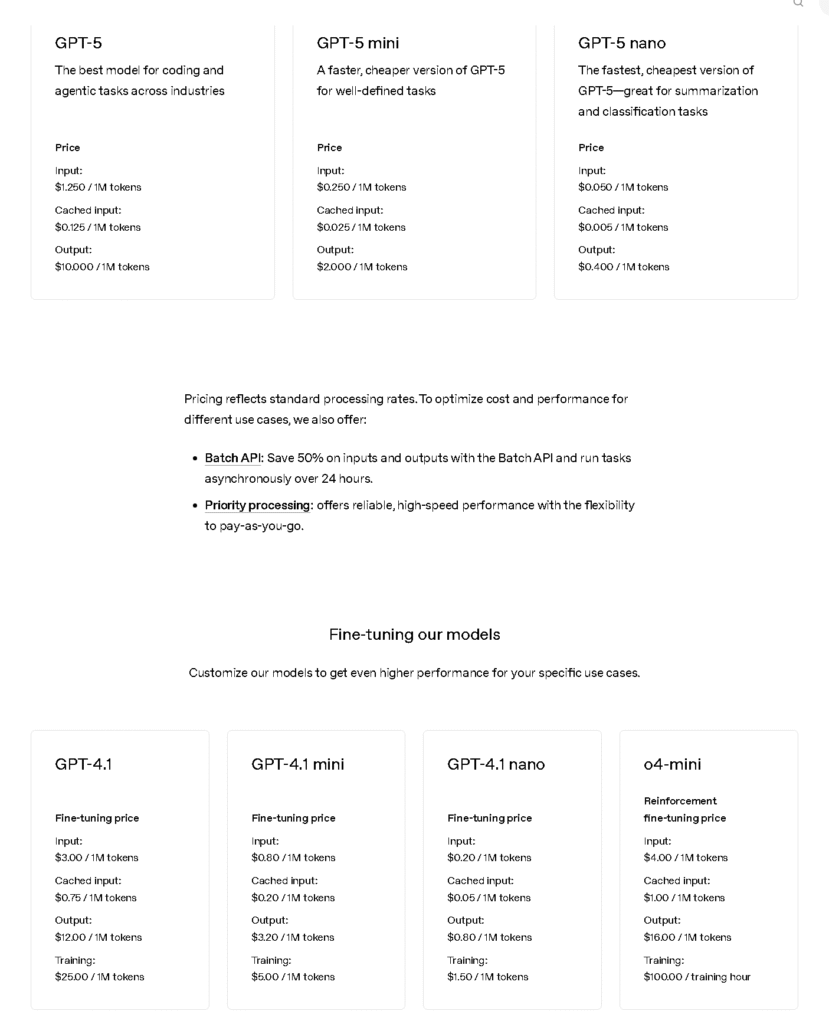
Why it’s good for startups:
OpenAI offers flexibility across tiers: you can start with GPT-3.5 at ~$0.002 per 1K tokens, then move up to GPT-4 Turbo (~$0.01–$0.03 per 1K tokens) once you need advanced reasoning. The ecosystem is mature, with strong documentation, SDKs, and community resources.
Best features for startups:
- Wide adoption = plenty of tutorials and integrations.
- Fine-tuning options available.
- Reliable uptime and enterprise-grade scaling.
Use cases:
- AI-powered chatbots.
- Content marketing automation.
- Code generation for developer tools.
Budget tip: Use GPT-3.5 for bulk tasks and GPT-4 Turbo selectively for high-value queries.
2. Claude API (Anthropic)
Safer and More Structured:
Anthropic’s Claude family is designed around safety, reliability, and structured outputs. With different versions like Claude 3 Haiku (lightweight, cost-effective) and Claude 3 Opus (powerful, premium), startups can choose based on budget.
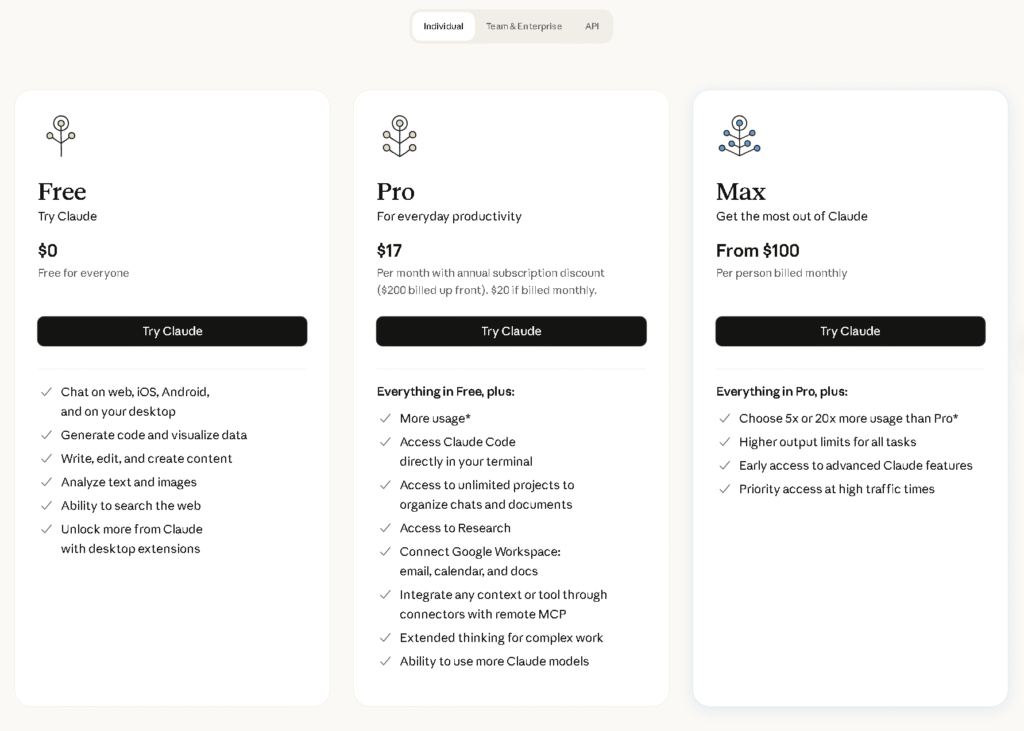
Why it’s good for startups:
If you’re in healthcare, finance, or education, Claude’s commitment to safety reduces compliance risks. Claude API pricing is transparent, and Haiku offers one of the most affordable entry points for structured generation.
Best features for startups:
- Great at long document summarization.
- Safer by design, fewer “hallucinations.”
- Strong at following instructions and formatting.
Use cases:
- Drafting contracts and policies.
- Knowledge base summarization.
- Educational tools requiring safer outputs.
Budget tip: Start with Claude 3 Haiku to control costs before scaling to larger models.
3. Cohere
Embeddings and Multilingual Strength:
Cohere isn’t just another GPT clone. It specializes in embeddings, classification, and multilingual text handling, which makes it especially useful for startups building search engines, recommendation systems, or global apps.
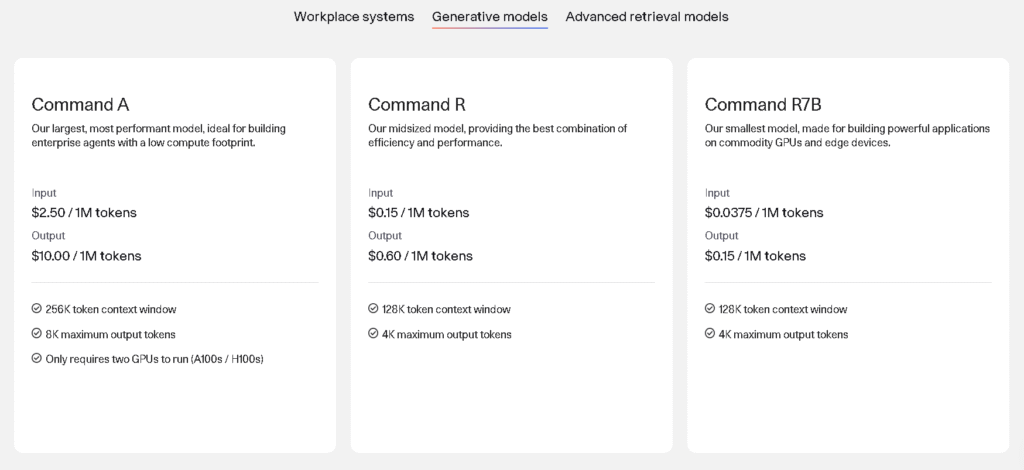
Why it’s good for startups:
Cohere’s affordable LLM APIs allow startups to build intelligent text processing workflows without overspending. Its multilingual support (over 100 languages) is a game-changer for businesses targeting global markets.
Best features for startups:
- Best-in-class embeddings for semantic search.
- Multilingual support out of the box.
- Partnership credits with accelerators.
Use cases:
- Search engines and product discovery.
- Language translation in SaaS apps.
- AI-driven content moderation.
Budget tip: Check if your accelerator (like YC or Techstars) has Cohere credits — many do.
4. Mistral
Open Weights for Cost Efficiency:
Mistral has quickly gained traction thanks to its open-weight models like Mistral 7B and Mixtral 8x7B. Unlike closed APIs, Mistral lets startups self-host or use managed APIs, giving maximum control over pricing and infrastructure.
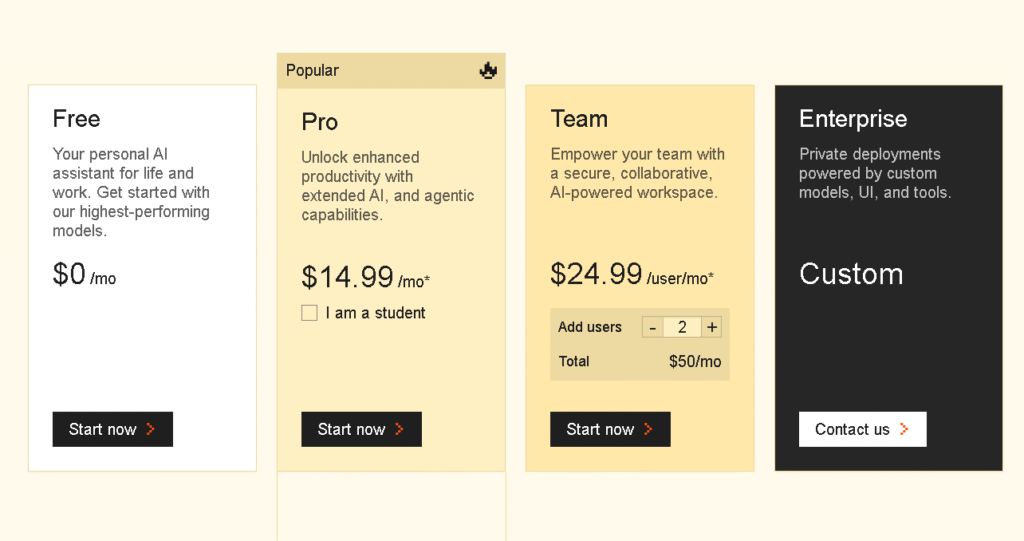
Why it’s good for startups:
For technically strong teams, self-hosting Mistral can be significantly cheaper than API fees in the long run. Its models are optimized for efficiency, meaning lower inference costs.
Best features for startups:
- Open weights = no vendor lock-in.
- Cost-effective compared to GPT-4.
- Competitive reasoning abilities.
Use cases:
- Custom AI assistants.
- Domain-specific model fine-tuning.
- Data-heavy applications requiring privacy.
Budget tip: Run Mistral on cloud GPUs for production, or locally for testing.
5. Meta LLaMA
Open-Source Community Power:
Meta’s LLaMA models (2 & 3) are among the most widely adopted open-source LLMs. Available freely for research and commercial use, they’ve become the backbone of many startup AI projects.
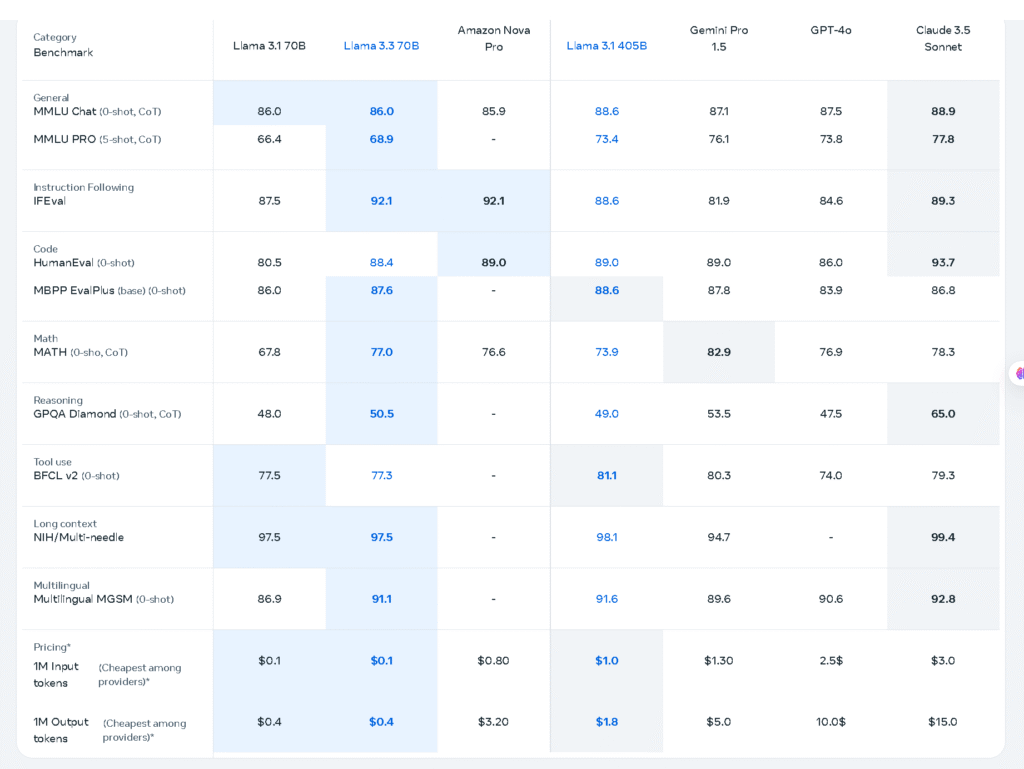
Why it’s good for startups:
The zero licensing fee is a huge win. With a vibrant open-source community, LLaMA gets constant optimization. Startups can prototype without worrying about usage bills, especially if they already have cloud resources.
Best features for startups:
- Free to use, modify, and fine-tune.
- Strong open-source developer community.
- Works with platforms like Hugging Face.
Use cases:
- Prototyping MVPs at zero cost.
- Research-heavy AI applications.
- Deploying in privacy-sensitive industries.
Budget tip: Use hosted services (like Hugging Face) initially, then shift to self-hosting once you scale.
6. Gemini API (Google DeepMind)
Ecosystem Advantage:
Google’s Gemini models integrate tightly with Google Cloud. Pricing is similar to GPT and Claude, but the real advantage comes from startup credits and ecosystem integration.
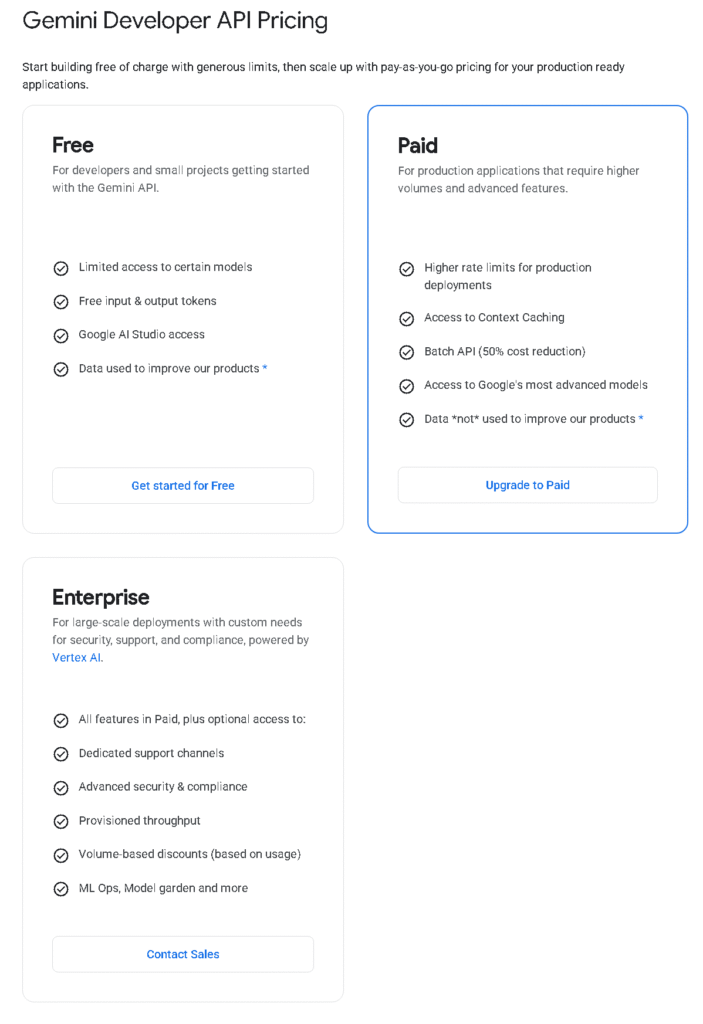
Why it’s good for startups:
If your stack already uses Google Workspace or Google Cloud, Gemini’s API is a natural fit. Plus, Google’s startup program often offers up to $200,000 in credits, which can offset LLM costs for a year or more.
Best features for startups:
- Strong reasoning and multimodal capabilities.
- Seamless integration with Google Docs, Sheets, and Drive.
- Large credit packages for eligible startups.
Use cases:
- Productivity AI tools.
- SaaS integrations with Google Workspace.
- Data analytics within Google Cloud.
Budget tip: Apply to the Google for Startups program early to maximize credits.
7. Hugging Face Inference API
Flexibility Without Lock-In:
Hugging Face offers a massive model hub with thousands of LLMs, from LLaMA to Falcon to Mistral. Its pay-as-you-go inference API allows startups to experiment without managing infrastructure.
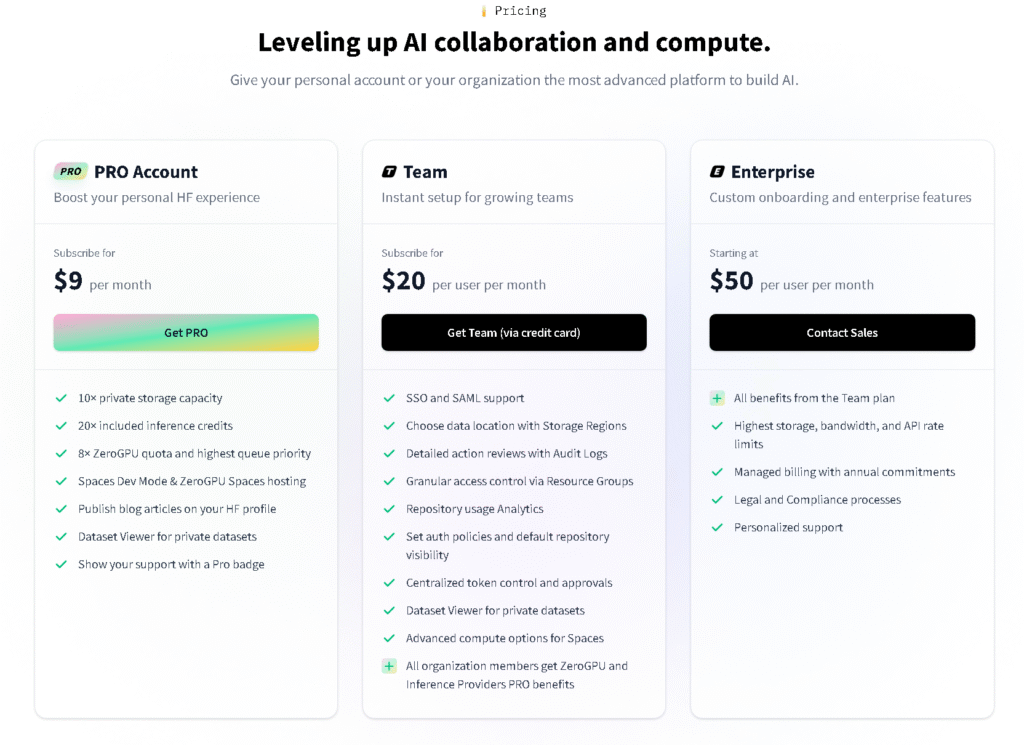
Why it’s good for startups:
It’s the best platform for trying multiple LLMs before committing. If your startup doesn’t yet know which model fits best, Hugging Face is the safest, most flexible testing ground.
Best features for startups:
- Thousands of models to choose from.
- Pay-per-use billing.
- Community-driven innovation.
Use cases:
- Rapid prototyping across LLMs.
- Testing different architectures.
- Building hybrid AI solutions.
Budget tip: Use the free inference API hours for prototyping before paying for production usage.
8. AI21 Labs
Reasoning-First Models:
AI21 Labs offers Jurassic-2 models, optimized for natural language reasoning and long-form outputs. Its models are priced competitively, making them attractive alternatives to GPT or Claude.
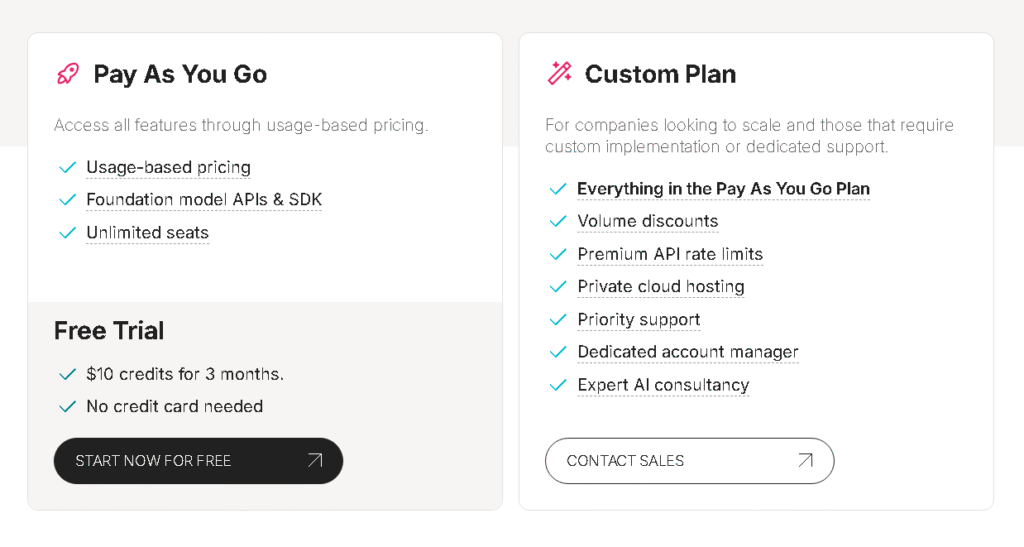
Why it’s good for startups:
Jurassic models shine in complex reasoning, structured writing, and long context windows. This makes them perfect for startups working in knowledge-intensive fields like law or research.
Best features for startups:
- Strong reasoning and logic.
- Long context handling.
- User-friendly AI Studio for non-technical teams.
Use cases:
- Drafting business reports.
- Analyzing large datasets.
- Legal tech and compliance tools.
Budget tip: Use AI Studio’s free tier to experiment before scaling API usage.
How Startups Can Maximize Value
- Reduce per-request overhead by batching queries.
- Prior to scaling up, start with smaller models (Claude Haiku, GPT-3.5).
- Use free prototyping by utilizing open-source LLM tools such as LLaMA.
- Apply for Cohere, OpenAI, AWS, and Google credits.
- Track usage with dashboards to avoid surprise bills.
Challenges of Budget AI Adoption
Budget adoption by startups AI tools frequently have unstated infrastructure expenses, like storage and GPU usage. Free tiers can be useful for prototyping, but as usage increases, they may cause problems with scaling. Furthermore, self-hosting open models raise security issues that need to be handled carefully.
Future Outlook for Startup AI Tools
With open source LLM tools models like Mistral and LLaMA continuing to reduce costs, the future of startup AI appears bright. It is anticipated that as provider competition grows, token prices will drop. Advanced AI will become more affordable for small businesses as more vendors launch startup-friendly "lite enterprise" tiers.
FAQ About Budget-Friendly LLM Tools for Startups
Q1. What is the cheapest LLM Tools for Startups in 2025?
The lowest-cost APIs are OpenAI GPT-3.5 (~$0.002/1K tokens) and Claude 3 Haiku (~$0.0025/1K tokens). For technical teams, Mistral and Meta LLaMA can be even cheaper if self-hosted.
Q2. Are there free LLM tools for startups?
Yes, options include:
- Meta LLaMA (open-source).
- Hugging Face free tier (limited usage).
- AI21 Studio free credits.
- OpenAI & Google Cloud trial programs.
Great for prototyping before moving to paid plans.
Q3. Which LLM tools are best for small businesses on a budget?
For small businesses on a budget, the best LLM tools include OpenAI GPT-3.5 for affordable general-purpose use, Claude 3 Haiku for safer outputs, Cohere for multilingual support, and LLaMA or Mistral if you can self-host for free.
Q4. How can startups optimize AI costs?
Startups can optimize AI costs by batching API requests, using smaller models like GPT-3.5 or Haiku for routine tasks, applying for startup credits, monitoring usage to prevent overages, and leveraging open-source tools whenever possible.
Q5. What’s the difference between open-source and paid LLMs?
- Open-source LLMs (LLaMA, Mistral): Free, customizable, need infrastructure.
- Paid APIs (OpenAI, Claude, Gemini): Easy to scale, but ongoing token costs.
Many startups use a hybrid approach open source for R&D, paid APIs for production.
Q6. Which LLM balances cost and performance best?
Claude 3 Haiku and GPT-3.5 are the most affordable yet reliable. For technical teams, Mistral offers strong performance at lower long-term costs when self-hosted.
Q7. Can a startup run LLMs under $50/month?
Yes. Use GPT-3.5 for light queries, Hugging Face’s free tier, or host a small open-source model like LLaMA 2 on a budget GPU. Perfect for early-stage prototypes.ideas without heavy expenses.
Conclusion: Choosing the Right LLM Tools for Startups
Because Meta LLaMA is open-source, it is the greatest free choice for startups. Claude Haiku or GPT-3.5 are excellent options for the best power-to-cost ratio. Mistral is the best option if your team is very technical, and Google Gemini is a good option for startups seeking large credits because of its ecosystem advantages.
The conclusion is that startups can now use LLMs without having to spend a lot of money. You can create robust AI products without breaking the bank if you have the correct combination of open-source tools and reasonably priced APIs.
At tooljunction, we share honest AI tool reviews and tutorials to help you choose the right tools for your business.
Next up: Explore OpenAI Cofounder Launches New AI Startup: Safe Tech in 2025 and Free Tools for Startups: Top 20 Essential Picks for 2025




